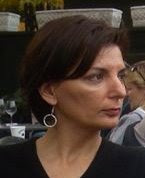Last night I finished reading two texts. As it happens, I usually have several books and magazines going at one time. Occasionally they intersect in a surprising way. It happened last night.
I was finishing A Short History of Myth by Karen Armstrong. It’s the first in Canongate’s Myth Series. I was also finishing Six Degrees of Separation by John Guare, a play that had been turned into a film with Will Smith and Stockard Channing that I had never seen.
The two works intersected at mythology and imagination. Karen Armstrong’s book is a scholarly look at mythology through the ages. She traces its evolution, links it to history, religion, and scientific thought. She posits that social and cultural shifts transformed mythology, used it where necessary, and discarded it where it wasn’t useful. She argues, or puts forward, that mythology is a necessity.
John Guare’s play, dense with so many emotional tangles, pivots on imagination. A line: “The imagination has moved out of the realm of being our link, our most personal link, with our inner lives and the world outside that world…I believe that the imagination is the passport we create to take us into the real world.”
I believe in the power of mythology. I love the stories, plain and simple, because they make sense. They make sense of things we take for granted, and they give cause to things we can’t wrap our heads around. It used to be that we (the collective ‘we’) would tell stories to explain the complex or the simple – why spiders spin webs, the origin of the constellations, why a turtle has a shell, why there are seasons, and so on. We don’t do that anymore. Why not?
Have we lost our imaginations? After all, it is the imagination that created mythology. It is imagination that helps us rationalize the world around us. It is imagination that fuels us to create something new out of something that seems ordinary. It is in the imagination’s pages, stamped with experience, that we travel.
I’m not saying creativity is dead. It’s not. Far from it. But we share a common dialogue about creativity. We no longer do so with mythology and, perhaps only occasionally with imagination.
Armstrong writes, “It has been said that history is a process of annihilation, since each new development requires the destruction of what has gone before…whenever they enter a new era of history, people change their ideas of both humanity and divinity.”
We have done that. And perhaps that’s why we moved away from mythology. Armstrong thinks this is the reason. She also says, “A myth, it will be recalled, is an event that – in some sense – happened once, but which also happens all the time.”
Myths are a way to work through our fears, justify our hopes, explain the nature of evil, and celebrate the power of goodness. We need mythology. Don’t you agree?

